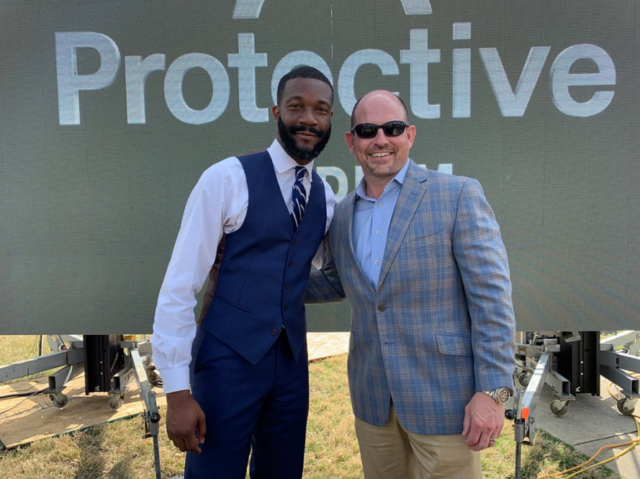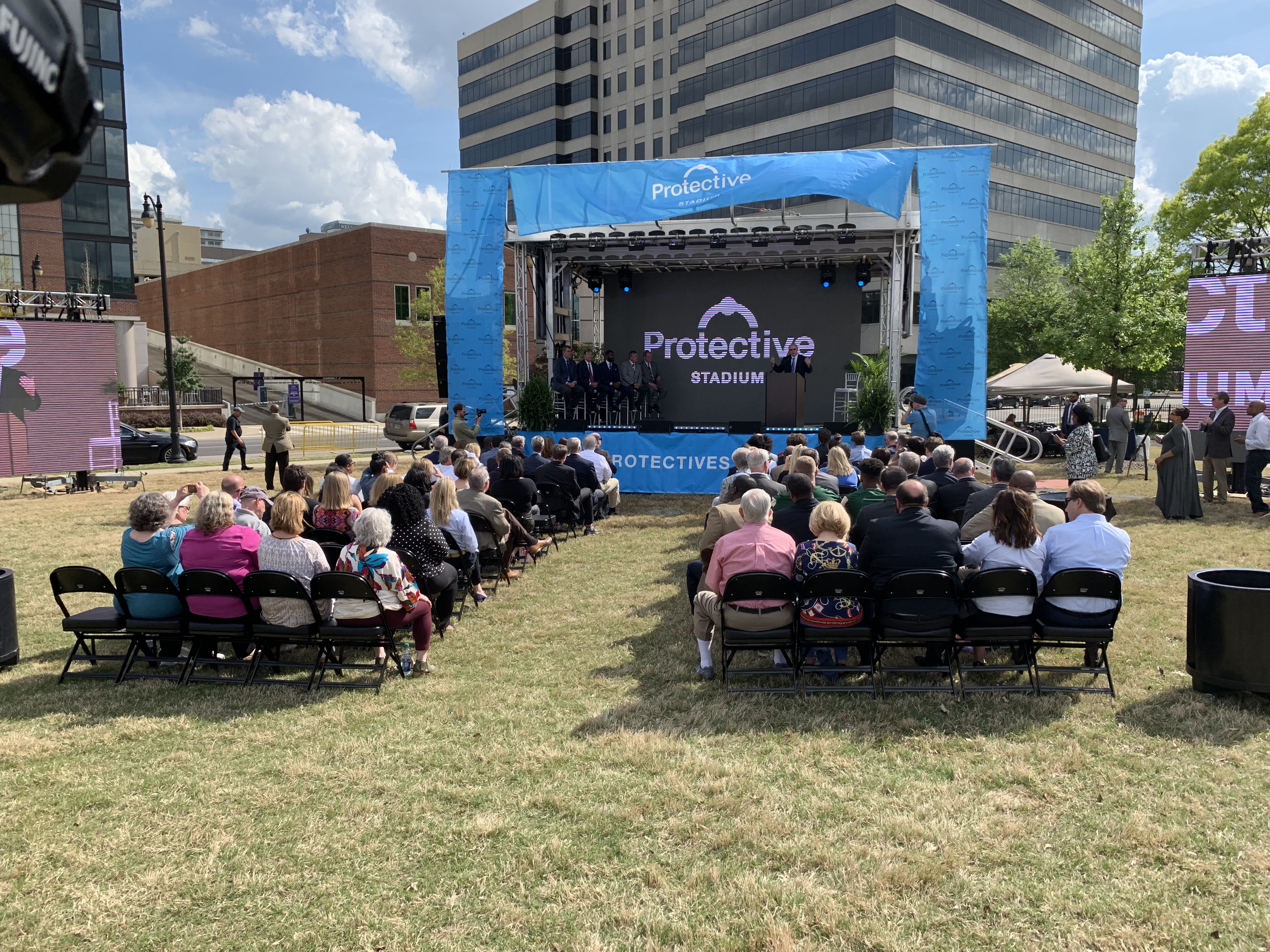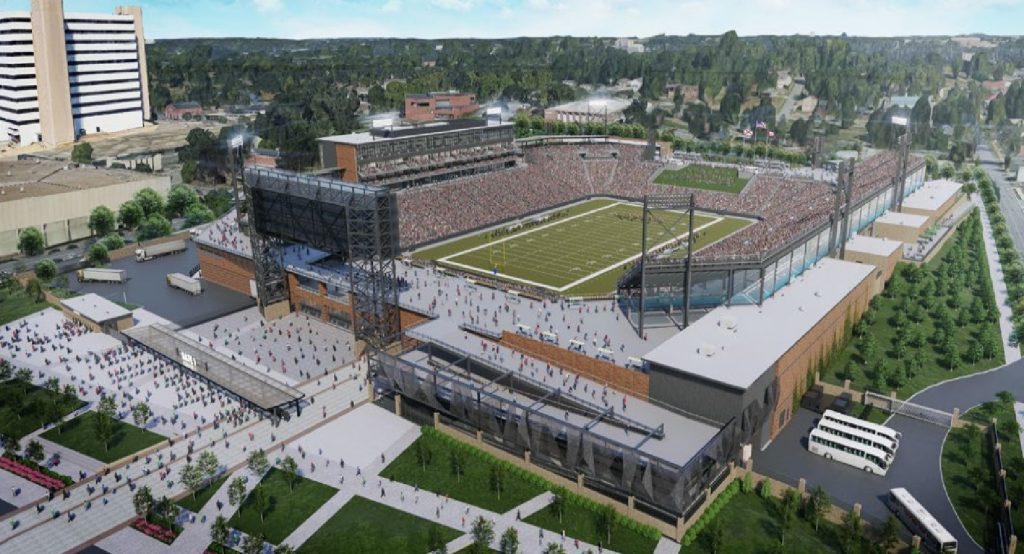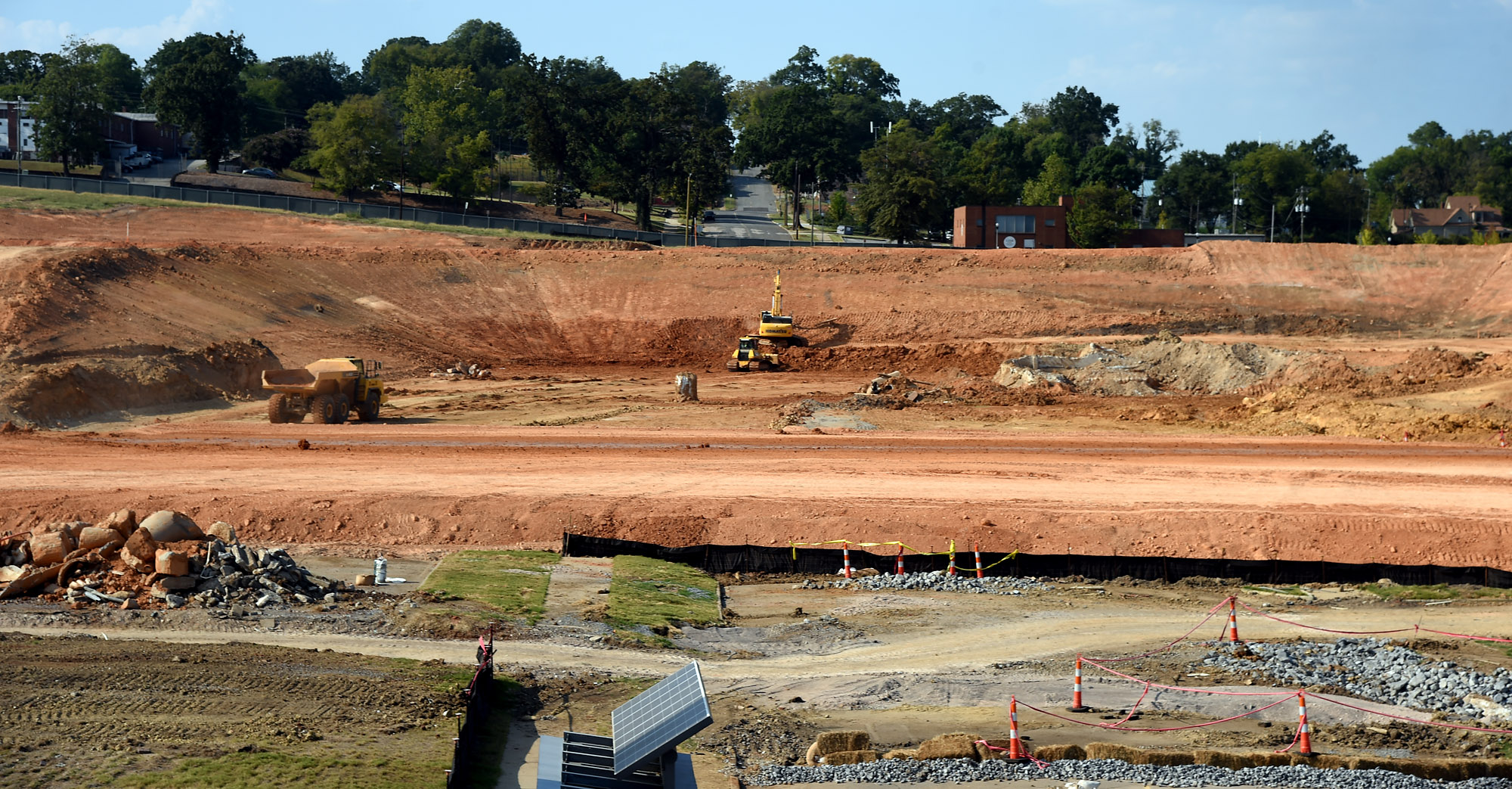
By Erica Wright
The Birmingham Times
When it came to building a new stadium in the city the proposition for Birmingham Mayor Randall Woodfin was simple: “Either we’re going to do it or we’re not.” After decades of talk in the Magic City about a new stadium, Woodfin said he had had enough.
“The stadium is not just a stadium. It’s all about supporting the [Birmingham-Jefferson Convention Complex (BJCC)], which includes convention space, a basketball arena, and a multipurpose arena,” said Woodfin, elected in 2017. “We’re either going to support tourism or not, … attract tourism or not. … One of the best ways to do that is [by supporting] your convention space.”
The stadium project is already under way.
The $174 million, open-air Protective Stadium will sit between the Topgolf event venue and the Birmingham Sheraton Hotel; it will seat about 45,000 people and be part of the BJCC. The stadium is set to be complete by the 2021 University of Alabama at Birmingham (UAB) Blazers football season and will be the future home of the defending Conference USA champions.
Given the history of inaction on a new stadium in Birmingham, building a multipurpose facility downtown became one of the mayor’s early projects after he took office.
“The BJCC had a plan of how to move the project forward, which [involved] convening power and bringing everybody to the table,” said Woodfin, in a recent interview with the Birmingham Times. “If the city is willing to bring this much amount of money, where are we going to get the other funds from?”
The mayor proposed that the city contribute $3 million per year for 30 years to help the BJCC finance the $300 renovation and expansion with an open-air stadium.
“The other part was the county: $30 million. The next part was the state through leveraging a bill that had already passed,” Woodfin said. “So, that was a large portion of the money. And then, . . . corporate Birmingham played a role.”
The combination of a four-way partnership among the city, the county, the state, and the private-corporate sector is what got the ball rolling, the mayor said: “If the city is going to be successful at any major project, [we] can’t go at it alone. [There has to be] a joint private-public partnership, and the partners came to the table.”
Money for Neighborhoods
Throughout the process, Woodfin has faced criticism. He had campaigned on helping the neighborhoods, but he seemed to pivot to a stadium once in office, according to critics. He said they are wrong.
“If there are going to be additional economic-development dollars from supporting tourism, sports, and entertainment and that money flows back into the neighborhoods. One hundred percent of these funds go to the 99 neighborhoods,” Woodfin said. “We want to make sure the surrounding neighborhoods get some of this growth.”
Projected revenue from the expansion and construction of the stadium will create a neighborhood revitalization fund, the city has said. The revenue can go to paving streets and installing more streetlights, as well as boosting the potential for residential growth by helping to raise property values and create the spinoff of an increased public-safety presence. Woodfin cites Carraway Hospital, not far from the new stadium site, as an example of that potential growth.
“It’s privately owned, and the person that privately owns it may want to negotiate with possible developers if, all of a sudden, [the area] looks different because it’s in proximity to our convention, entertainment, and tourism space,” he said.
Magic City Classic
There also have been discussions about what the new stadium could mean for the annual Magic City Classic football game between Alabama Agricultural and Mechanical University (AAMU) and Alabama State University (ASU), which has been played at Legion Field every year since 1946. Woodfin said he is aware of the talk, but the only opinions that matter to him are those of the presidents of AAMU and ASU “because they decide where they want to play, [and] people need to respect that.”
“It doesn’t matter what I want,” the mayor added. “I can suggest what I want, but at the beginning and the end of the day, people need to realize that those presidents and their athletic directors determine where they want to play. If they want to stay at Legion Field, they’re going to stay at Legion Field.”
And there’s a bigger issue that many may miss, according to Woodfin.
“I don’t care where they play, as long as they play in Birmingham,” he said. “Other cities are attracted to the Magic City Classic, and we need to know that people are trying to lure them away. The best way to do that is by talking about the amenities they offer in their cities with their sports complexes. The city of Birmingham needs to be in a position, if we want to keep hosting the Classic, to stay tight and continue relationships with those presidents. … I’m not going to get caught up in the semantics of people bashing a new stadium for tenants who haven’t even opened their mouths about where they want to play.”
Moving the Ball Forward
The worst thing that can happen for the future of the Magic City Classic and the investment in Birmingham’s neighborhoods is for the city to fall behind other progressive municipalities, such as Atlanta, Ga., Nashville, Tenn., and Charlotte, N.C., Woodfin said. Atlanta has convention space, basketball and football arenas, and eateries are all in the same space. Soon, Birmingham will be no different.
“In Birmingham, [we] have convention space, Legacy Arena, this new stadium, the Uptown [Entertainment District], hotels—no different,” said Woodfin. “If you go to Arlington, Texas, and walk out of [AT&T Stadium, where the NFL’s Dallas Cowboys play], [Globe Life Park, where the MLB Texas Rangers will play until 2020], is right on top of it. You walk out, and there is a complex that combines 30 restaurants and bars and a hotel right in the middle of that. I could go on and on, … but you connect your tourism space to your sports space to your hotels and eateries.”
Birmingham on the Map
The construction and completion of the new stadium has potential to brand Birmingham as an even more progressive city, Woodfin said.
“We talk about a lot of things we want to do, but we have to do it or shut up and move on,” he said. “I think completing this project sends a signal to the people who live in this city and to the world that Birmingham is progressive, we’re open for business and can compete with any other city as it relates to attracting tourism and conventions.
“The city of Birmingham should invest in and support its convention space. The city should invest in and support its entertainment space in this new stadium and the renovation of Legacy Arena. We … are a city that’s already dependent on its tax base with a heavy dependency on sales tax, occupational tax, and business licenses, [so] we need to make sure those areas grow. The best way to grow in those areas is to be competitive in tourism and conventions.
“I don’t want our residents to have to leave Birmingham to drive to Nashville or Atlanta to be entertained because they deserve to have the same opportunity in the city they live in,” he continued. “They might as well keep their local money in our local economy.”
Woodfin said he is proud when visitors from around the state come to the Magic City.
“They come here to play and have fun,” he said. “They come here for our renowned restaurants, for concerts, for events. Its family fun … for everybody: black people, white people, people in every socioeconomic status. It’s for Walker, Blount, Shelby, St. Clair, and Tuscaloosa counties. … People want to be here. They see the progress, and they want to be a part of it.”
The partnership also bodes well for other initiatives in the area, such as the Birmingham Promise, a public-private effort that launched this summer through which Birmingham City School students get apprenticeships at local businesses.
“If we can do a public-private partnership around a stadium and if we can do one to support the Birmingham Zoo, Museum of Art, Botanical Gardens, and Vulcan, then don’t tell me we can’t do those same partnerships to support our children,” Woodfin said. “I’m not deviating from that. I think it’s all mutual benefit. … We support a stadium not just because we believe in sports, but we believe in economic development and tourism. Birmingham Promise is no different as it relates to a continued example of the next big deal in Birmingham around a public-private partnership.”























